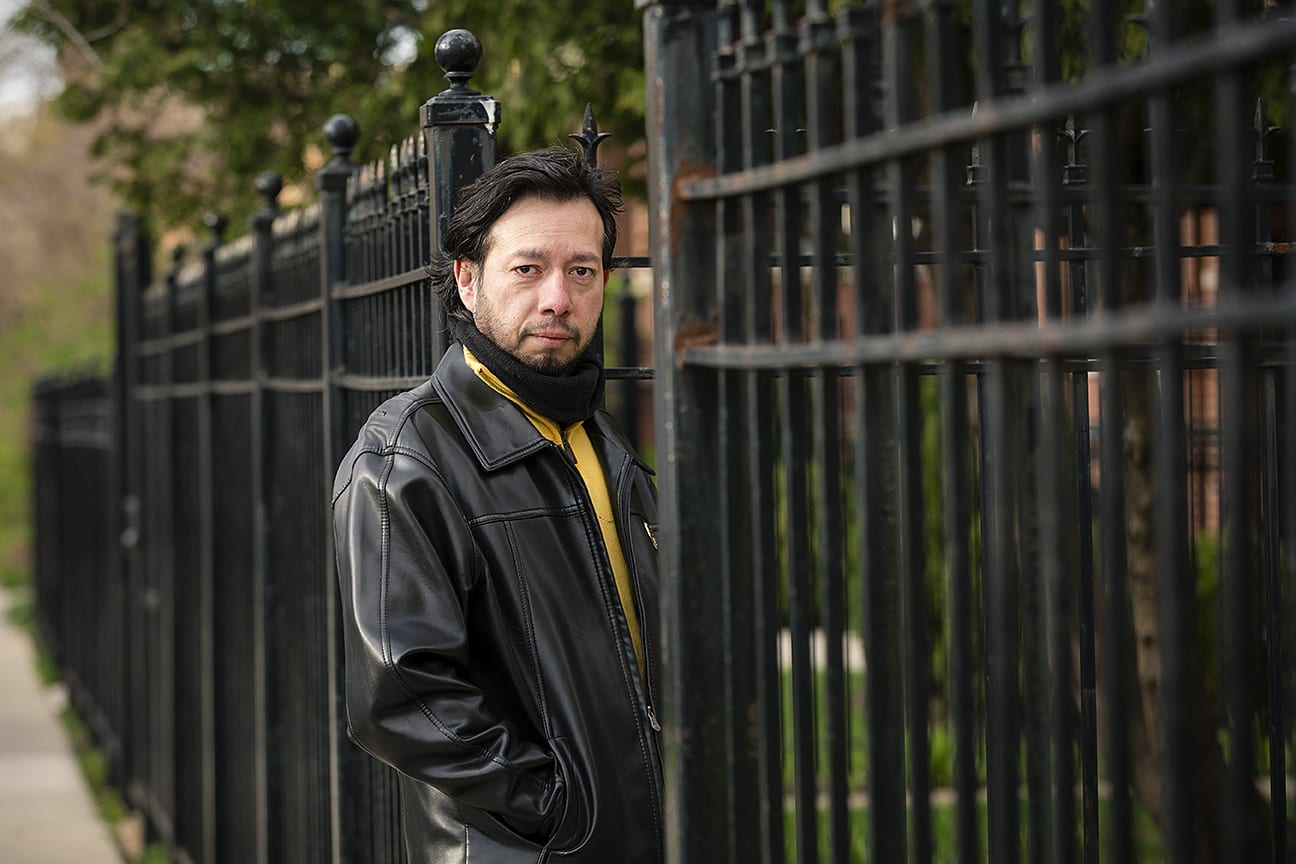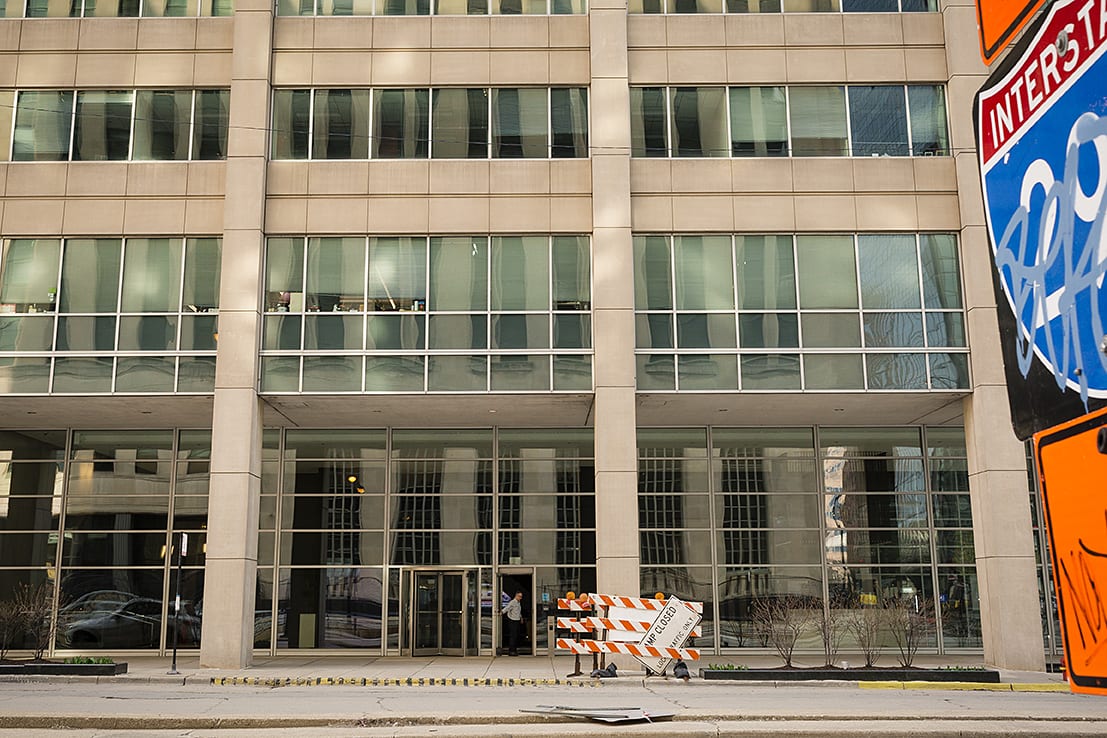
How the coronavirus pandemic is straining immigration court and detention systems in the Midwest.
Above: Francisco Silva Flores pictured outside his Albany Park home on April 14, 2020. Photo by Michelle Kanaar.
Update, April 16, 2020: The Department of Justice announced at 10:14 pm on Wednesday April 15 that the Chicago Immigration Court will be closed Thursday April 16. The closure was due to someone who had been to court to support a family member testing positive for COVID-19, said a source inside the court.
When Francisco Silva Flores started feeling sick last month while detained by Immigration and Customs Enforcement at the Kankakee County jail, he was worried. The 49-year-old’s eyes were watery and felt infected, his nose was stuffy, and his entire body ached.
Flores said he had heard about the coronavirus pandemic from the jail common room’s television. News reports explained how certain groups were at a higher risk of dying from the virus. Flores was recently diagnosed with diabetes and was concerned he could die if exposed to COVID-19. There were also rumors that someone at the detention center was already infected with the virus. With people being transferred into and out of the detention center every week, it was easy to see how the infection could quickly spread.
“Everyone said that if the coronavirus got in the detention center through an individual or a guard, it would be terrible,” Flores said. “It’s not possible to have good hygiene there or wash yourself well since you have to share the bathroom with another 40 people or so.”

Francisco Silva Flores pictured outside his Albany Park home on April 14, 2020. Flores was released from Kankakee County Jail on March 25, 2020 after Immigration and Customs Enforcement had taken him into custody in August 2019. Photo by Michelle Kanaar.
Flores asked to see a doctor and was told by a nurse an appointment would be scheduled. Three weeks later he said he had yet to see a doctor and still felt sick.
The jail has a medical team on staff and nurses come to see the immigrant detainees twice a day, according to Chad Kolitwenzew, the chief of corrections at the Kankakee County Sheriff’s Office. Kolitwenzew was not familiar with Flores’ illness in particular, but said that the jail has been taking steps to protect both detainees and corrections officers from COVID-19 since early March when they stopped allowing in-person visits to the jail. He said that the jail posted information about COVID-19 sometime in the first half of March and that the facility is cleaned four times a day.
Despite these steps, Flores’ family and attorneys feared for his safety.
“We know immigration jails and prisons can be hotspots for diseases like this. Francisco would be very susceptible to getting infected with COVID-19 and it would be incredibly dangerous to his health because of his diabetes diagnosis,” said Alison Heinen, an attorney and Equal Justice Works fellow at Beyond Legal Aid representing Flores.
“That just wasn’t acceptable to us,” Heinen said.
As COVID-19 spreads throughout the United States a growing number of people are warning that a widespread outbreak in the immigrant detention system is very possible. A similar outbreak at the Cook County Jail in Chicago has caused over 300 detainees to contract coronavirus and at least three to die. At the same time detained immigrants, their lawyers, and community leaders struggle to navigate an immigration court and detention system straining under the pressure of the pandemic.
A “Hotspot” For Disease
The United States incarcerates more immigrants than any other nation in the world. ICE currently has an estimated 37,000 immigrants detained in more than 130 facilities across the country — including county jails and privately-run facilities. Kanakee’s Jerome Combs Detention Center, an hour outside of Chicago, is one of several immigrant detention centers in the Midwest.
Washing hands, sanitizing surfaces and social distancing are key to slowing the spread of the coronavirus, according to the Centers for Disease Control.
Yet Immigration attorneys and advocates have long criticized the medical care and cleanliness of such facilities. With the spread of COVID-19 the advocacy organization Freedom for Immigrants set up a hotline to address the pandemic and has received complaints about a lack of soap, hand sanitizer and cleaning supplies at 28 immigrant detention centers.
“Overcrowding, poor sanitation, inadequate healthcare, and difficulty containing contagious diseases are well documented in ICE’s immigration detention system,” said Allen S. Keller and Benjamin D. Wagner of New York University’s School of Medicine, in a recent article in the Lancet Public Health journal. “Distancing and other necessary measures to prevent SARS-CoV-2 [the virus that causes COVID-19] from spreading are not possible in immigrant prisons.”
Last summer at least two detainees at the Kenosha detention center in Wisconsin were treated for mumps. By this March the Kenosha County sheriff’s office told ICE it would not take any new detainees due to concerns about the spread of coronavirus in the jail.
ICE then moved all 170 detainees who were housed in the Kenosha facility, which is an hour north of Chicago. Attorneys for the detainees said many were sent to facilities as far away as Texas.
Two doctors who have extensive experience in the immigrant detention system wrote in a March 19 letter to the House Committee on Homeland Security that the shuffling of detainees around the country like this “could rapidly disseminate the virus throughout the entire system with devastating consequences to public health.”
ICE outlined its requirements for detention centers in response to the COVID-19 pandemic in an April 10 document. These include reporting all suspected and confirmed coronavirus cases to ICE headquarters and ensuring that facilities have enough soap, hand sanitizer and face masks in case of a COVID-19 outbreak.
ICE had 89 confirmed cases of COVID-19 among those in their custody as of midday April 15, including three in the Pulaski County Detention Center in southern Illinois.
ICE has full authority to release detained immigrants and has made efforts in recent weeks to release high-risk detainees like Flores and those who have tested positive for COVID-19.
Last month ICE’s Enforcement and Removal Operations identified more than 550 detainees over the age of 60 or pregnant who they deemed might be at a higher risk for severe illness during the COVID-19 pandemic. Of these, ICE found that more than 160 detainees could be released “after evaluating their immigration history, criminal record, potential threat to public safety, flight risk, and national security concerns.”
Additionally, ICE has been reducing the number of new immigrants it detains. The agency reported April 6 that the detained population has dropped by more than 4,000 people since March 1, 2020, with a more than 60 percent decrease in new detainees when compared to this time last year.
Confusion At The Court
The detainees ICE chooses to keep in detention may still be released by either posting bail or through the orders of an immigration judge.
When the Chicago Immigration Court rolled out coronavirus prevention measures last month, hearings for non-detained immigrants were postponed. Attorneys representing detained immigrants were also encouraged to stay home and represent their clients by phone. But in a system reliant on paper and in-person meetings, the transition has not been smooth.

Chicago’s Immigration Court remains open on April 8, 2020. Last month unions for immigration judges and government immigration prosecutors, as well as the national association of immigration lawyers, came together demanding all immigration courts be closed for the duration of the coronavirus pandemic, as many federal district courts and local courts have done. Photo by Michelle Kanaar.
“I called the courthouse and asked, ‘Can I email or fax the motion?’ And they were like, ‘No, you need to FedEx it over,” said Elisabeth Carlson, an immigration attorney at Kempster, Corcoran Quiceno & Lenz-Calvo, Ltd. “You just hope that they open the FedEx and look at it.”
Carlson was scheduled to represent a man picked up by ICE in Indiana after a traffic stop. Following the court’s guidance, she sent in a motion to appear via phone at the March 30 hearing along with her cell phone number since her law office was closed. But at the time of the hearing her cell phone never rang.
“When I called the courthouse, the clerk was like, ‘I can’t leave my desk.” And I said, ‘Can you email, can you buzz the judge? Can you help me here?’ She was not able to help me,” Carlson said.
She eventually drove to the courthouse only to learn the hearing had been moved to later in the week. It’s likely she would have missed the second court date too, if she had not come to the court building. The government would have likely mailed her the hearing notice through the U.S. Postal Service and it probably wouldn’t have arrived in time, she said.
“That’s the frustration. Everything is backlogged and not working perfectly,” Carlson said.
The judge later apologized and explained that she had called another number the court had on file instead of Carlson’s cell phone number. But Carlson says she would rather risk getting sick by going into a courtroom for future hearings than try the phone system again.
“Whether you feel like you can diligently represent your client when you’re not there in person is an X-factor, and I’m not there yet,” she said.
The Department of Justice’s Executive Office for Immigration Review, which runs the court system, has taken steps in recent days to streamline the telephone process and set up email addresses so attorneys can submit paperwork online instead of in person or via FedEx.
Gail Montenegro, a Chicago spokesperson for EOIR, said that they do not track how often a judge has trouble getting a hold of attorneys during hearings, and they have continued to encourage attorneys to represent their clients by phone.
“EOIR takes the safety, health, and well-being of its employees very seriously, and will continue responding to this rapidly evolving pandemic, while ensuring the continuation of its critical missions,” said Montenegro.
But a growing number of professional and community organizations say more is needed.
A Total Shutdown?
In an unprecedented move last month, unions for immigration judges and government immigration prosecutors, as well as the national association of immigration lawyers, came together demanding all immigration courts be closed for the duration of the coronavirus pandemic, as many federal district courts and local courts have done.
“Across the nation public health experts and government officials are trying to slow the spread of the coronavirus through social distancing, banning group gatherings, disinfecting surfaces and other means,” said Judge Ashley Tabaddor, president of the National Association of Immigration Judges, in a statement renewing their demand on March 22.
“Failing to close all of the nation’s Immigration Courts, both non-detained and detained settings, now will exacerbate a once-in-a-century public health crisis and lead to a greater loss of life. We cannot afford to wait another week,” she said.
The Department of Justice has postponed all hearings scheduled for non-detained immigrants through May 1 and has closed some of the 68 immigration courts nationwide temporarily as cases of COVID-19 among staff or other issues arise at individual courthouses. It’s announcing court closures via their website and on Twitter, often the night before or morning of the closure, adding to attorneys’ confusion.
The Chicago Immigration Court’s Montenegro said the office “has been carefully reviewing the information available from local, state, regional, and federal officials related to the coronavirus pandemic” and that “the agency continues to evaluate the dynamic situation nationwide and will make decisions for each location as more information becomes available.”
But local representatives from the American Immigration Lawyers Association and the National Association of Immigration Judges say that the courts should be shut down altogether, as the criminal and civil courts have been in Chicago.

Judge Samuel Cole of Chicago’s Immigration Court and director of communications of the National Association of Immigration Judges, pictured on April 10, 2020 outside his home in suburban Chicago. Photo by Michelle Kanaar.
“We are really an outlier,” said Judge Samuel Cole of Chicago’s Immigration Court. He also serves as the director of communications for the NAIJ.
“[The Executive Office for Immigration Review] is refusing to take the required steps that it should take in accordance with the public health guidance,” Cole said.
Urgent court matters, like bond hearings, should be conducted over the phone with judges, clerks and attorneys all working from home, Cole argued.
“This is not 21st century technology that we need to use to do this. It’s conference call technology,” Cole said.
In Chicago, immigration court has remained open for detainee hearings, but families were not able to post bail to release their detained loved ones for almost a week last month when the local ICE Enforcement and Removal Operations field office shut down. ERO suggested people travel to one of the four ERO Chicago sub-offices to make immigration bond payments during that time — one of which is in Wichita, Kansas and 700 miles away from Chicago.
Once a family posts bond for a detainee or ICE decides to release them they must now travel to the jail or private detention center in order to pick them up unless they are being held at the McHenry County facility. Previously, the government would transport detainees to Chicago after releasing them.
Exposing Larger Problems
What is happening at the immigration court during the pandemic is indicative of larger problems with the court being under the control of the U.S. Attorney General William Barr, said Cole.
“This really shows the need to take the immigration courts out of politics,” he said. “What is going on here is the result of the immigration courts being used as an arm of the immigration enforcement agency instead of as a neutral court. This is absolutely exhibit number one to the need for an independent immigration court.”
Heinen, Flores’ attorney, agrees. The COVID-19 crisis has shined light on larger issues of how people are prosecuted and detained for immigration violations in the United States. Once an immigrant is caught in the system what ICE or a judge decides regarding someone’s release seems very inconsistent, Heinen said.
A release can depend on anything from what region an immigrant is in to whether they’re in a giant, privately contracted detention center or a smaller county jail just contracting out beds for ICE.
“Or it could depend on what judge you have,” Heinen said. “It feels like a mess. There’s a lot of harm in that unknown and in not being able to let people know whether they have to sit there and worry for their safety and well-being and whether they’re going to even live if they contract this virus.”
In recent weeks, prominent national organizations as well local ones like the Illinois Coalition for Immigrant and Refugee Rights have called on ICE to release all detained immigrants in order to prevent the spread of the coronavirus. Former ICE director John Sandweg, who served under former President Barack Obama, recently lent his voice to the campaign. He argued “preventing the virus from being introduced into these facilities is impossible.”
Both ICE and immigration courts have stated that they have no plans to shut down detention centers or cancel all hearings. But they do assert they’ve taken steps to curb the spread of coronavirus in their facilities.
Healing At Home
Before being sent to Kankakee Flores lived in Chicago’s Albany Park neighborhood for twenty years. He supported his partner and teenage son by working at a dry cleaner’s. ICE became interested in him after he was convicted of a DUI. He was taken into custody in August of last year during a check-in at ICE’s field office downtown.
ICE then began the process of trying to deport him to Mexico. But in January, an immigration court judge granted him relief from removal allowing him to stay in the United States. The government’s lawyers appealed the decision and ICE said Flores had to remain at Kankakee.
Flores had been detained for nearly seven months by the time Gov. J.B. Pritzker shut down all schools in Illinois and imposed a stay-at-home order to curb the spread of the coronavirus.
“What it all comes down to is that he was an extremely low-risk individual to begin with based on his record. The judge had already granted him relief, the government would have his information and would know where he is,” Heinen said. “Francisco could better manage his health outside of a detention center where he was only getting minimal treatment and very little access to medical professionals.”
Flores’ attorneys at Beyond Legal Aid had planned on making a humanitarian parole request to ICE because of his health condition. Before they could, however, ICE released him from Kankakee on March 25.

Rodrigo Anzures-Oyorzabal, Francisco Silva Flores, Felipe, and Irene Romulo pose for a photo after Flores was released from Kankakee County Jail on March 25, 2020. Photo Courtesy of Irene Romulo.
“My wife and son are happy that I am back home now,” Flores said.
Since returning home Flores has slowly recovered. He’s not sure what he was sick with but now that he’s out his thoughts are with the people still at Kankakee. Especially the elderly detainees.
“I wish the doctors there would take better care of people, regardless of their immigration cases, which are very arbitrary for many people,” said Flores.
Michelle Kanaar contributed to the reporting of this story.
Have questions about the coronavirus and how to protect yourself from COVID-19? Read the CDC’s guide to the coronavirus here.
Support Us

